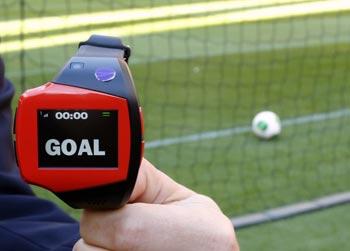 | « Back to article | Print this article |
A fourth system of goal-line technology has been approved and granted a licence, soccer's governing body FIFA said on Friday.
FIFA said that the German-produced GoalControl 4D used 14 high-speed cameras placed around the pitch and directed at both goals to determine whether the ball had entered the goal.
"The position of the ball is continually and automatically captured in three dimensions as soon as it approaches the goal-line," said FIFA in a statement.
"When the ball has completely crossed the line, the central analysis unit sends an encrypted signal to the referee's watch in less than a second. GoalControl 4D can be used with both standard goalposts and balls."
On Monday, the German-manufactured Cairos system, which uses magnetic fields around the goals, was also granted a license.
 The systems previously approved are Hawk-Eye, which is used in tennis and cricket and like GoalControl is optical-based, and GoalRef, which uses magnetic fields.
The systems previously approved are Hawk-Eye, which is used in tennis and cricket and like GoalControl is optical-based, and GoalRef, which uses magnetic fields.
FIFA approved the use of goal-line technology last year following a number of controversial incidents where teams had legitimate goals disallowed because officials wrongly judged that the ball had not crossed the line.
European soccer's governing body UEFA has yet to adopt goal-line technology, preferring to employ an extra linesman behind each goal.
The four systems will all participate in a tender to provide goal-line technology at this year's Confederations Cup and the 2014 World Cup in Brazil.
FIFA used both GoalRef and Hawkeye at last year's World Club Cup in Japan, when goal-line technology was used for the first time in professional matches. However, only one system is likely to be chosen for the World Cup.
Photograph: Toru Hanai/Reuters
